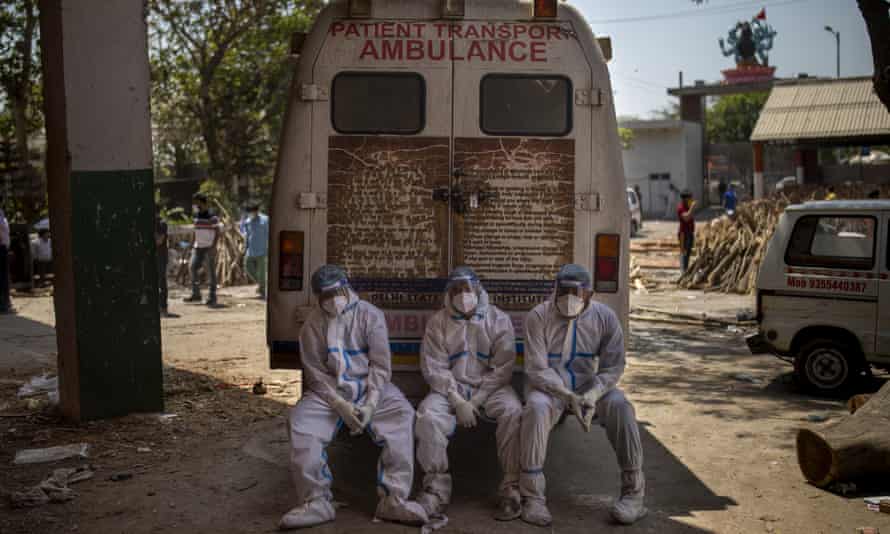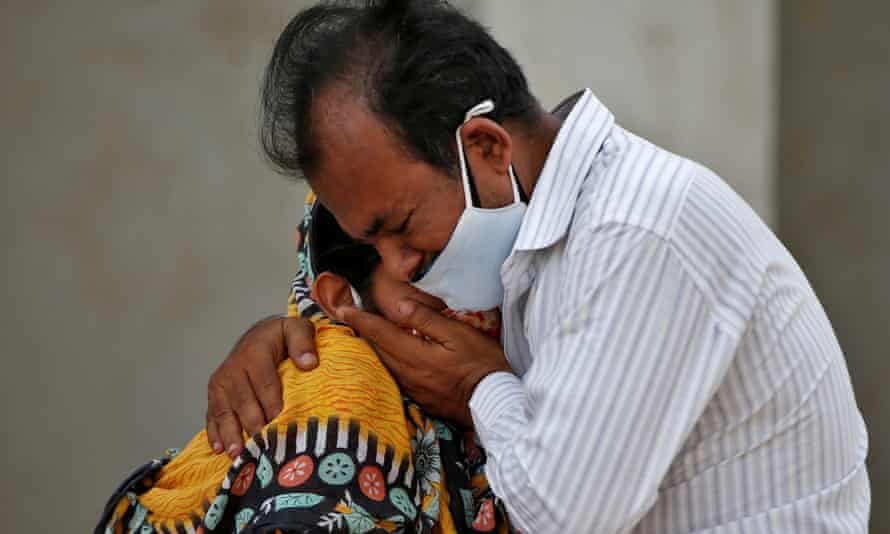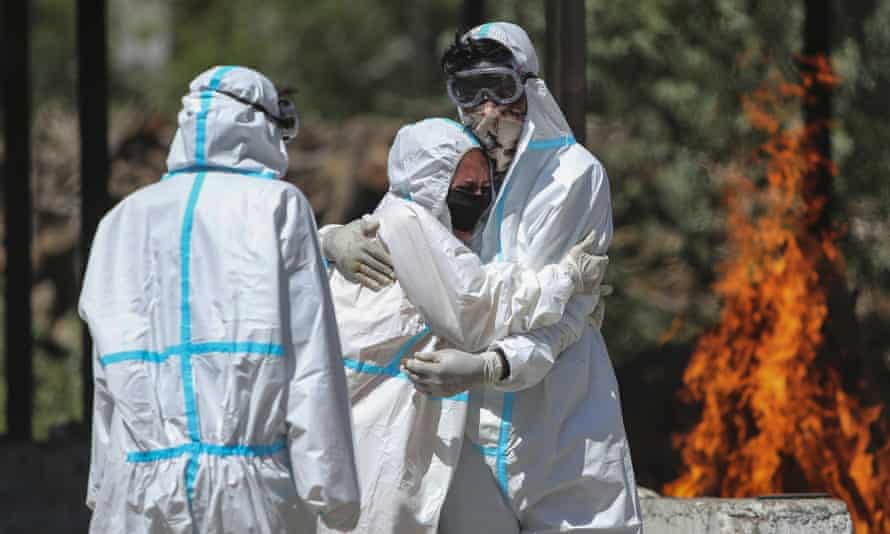Extract from The Guardian
A Sydney cardiologist who has had two relatives die of coronavirus in India is urging Scott Morrison to set up a separate quarantine facility for arrivals from that country to allow for mass repatriation.

Exhausted workers who bring dead bodies for cremation sit on the rear step of an ambulance inside a crematorium in New Delhi at the weekend.
Last modified on Mon 26 Apr 2021 20.07 AEST
Sydney-based cardiologist Dr Yadu Singh has spent the past few days frantically calling doctors and hospitals around New Delhi and his home state of Uttar Pradesh to find a hospital bed with oxygen for a young relative who had contracted Covid-19.
Singh’s niece’s husband, 29, who lives in Delhi, was having breathing difficulties but was unable to find a hospital bed in the entire city to provide oxygen treatment, as India grapples with a record surge in coronavirus cases.
He was eventually admitted to hospital in a town seven-and-a-half hours away and is now stable, but two of Singh’s other relatives in India have recently died.
“My whole family lives there, my brothers, my cousins … and every Indian Australian living in Australia has been affected in one way by this,” Singh told Guardian Australia.
Singh, who is president of the Federation of Indian Associations of New South Wales and current chair of the Council of Indian Federations of Australia, sympathised with Australia’s position on limiting arrivals from India but said the Morrison government was “morally obliged to do everything for Australians who are stuck there”, as well as assist India to protect its citizens.
“I have been approached by a lot of Indians in Australia who say we actually need to do more. I urge Mr Morrison to consider a separate quarantine facility, where they are not causing risk to other arrivals,” Singh said.
“Some of these people have been trying to get home for many months, and were visiting family there last year when borders first closed.”

A woman is consoled by a relative outside a Covid-19 hospital in Ahmedabad, India, on Monday after her husband died there from coronavirus. Photograph: Amit Dave/Reuters
As members of India’s 700,000-strong diaspora in Australia watch events unfolding in the subcontinent “with angst and anguish”, Singh called on the Australian government to consider sending vaccines and distributing them from its four diplomatic postings in the country.
He initially accepted the government’s decision on Friday to cut flights from India by 30% – announced last Thursday – but Singh shifted his position as the situation worsened over the weekend.
“My God, the numbers are horrendous and we think even they are underreported.”
In light of the rapidly rising case numbers, Singh said the federal government should set up new quarantine facilities – separate to the existing system – to allow for a mass repatriation from the country that does not risk infecting arrivals from other countries with the more virulent strain from India.
However, the federal government is instead reportedly considering a further reduction, or even a ban on all flights from India due to the high case numbers.
Cabinet’s national security committee will meet on Tuesday to discuss stricter measures and decide on assistance for the ailing country.
India’s acting high commissioner to Australia, PS Karthigeyan, has told Guardian Australia that Indian officials are in negotiations with Australia about the urgent need for supplies.
“We are in touch with them about some priority items that are required in India now,” Karthigeyan said, adding: “We would very much like them to understand the gravity of the situation in India.”
The federal health minister, Greg Hunt, said on Monday this “particular request is for assistance with regards to the physical supply of oxygen”, and that Australia was “in a position to be able to supply non-invasive ventilators”.
Hunt warned there could be further cuts to passenger numbers from India.
Karthigeyan said the reduced capacity limits placed on flights from India to Australia mostly affected one direct flight a week into Sydney, and that had already been flying at a reduced capacity of about 30 passengers.

A relative of a person who died of Covid is consoled by another during a cremation in Jammu, India, on Sunday. Delhi has been cremating so many bodies of coronavirus victims that authorities are getting requests to start cutting down trees in city parks. Photograph: Channi Anand/AP
He said the limits presented a problem for the Indian diaspora that had been stuck in India for months, as well as for those who had travelled with a valid exemption, and that he expected movement issues to continue to be a problem.
Karthigeyan estimated about 10,000 Australian Indians and expats were currently stranded in India.
If they are asked to send oxygen supplies or ventilators, they should. This is what friends do
He also said the outbreak and passenger limits were likely to further frustrate the thousands of Indian citizens who were international students at Australian universities who have not been able to return for physical study.
The focus on Australian assistance follows announcements overnight that the US would immediately provide raw materials for vaccine manufacturing and that the UK had dispatched ventilators and oxygen to Delhi.
India
reported 349,691 new cases on Sunday, a record increase for the fourth
consecutive day, and 2,767 people dead. France, Germany and its
neighbour Pakistan – a traditional foe – have offered to send equipment
to Indian hospitals that are running short of life-saving oxygen, with
reports of patients dying while waiting to see doctors.
Singh also urged Australia to accept any requests to help Indian citizens.
“If they are asked to send oxygen supplies or ventilators, they should,” he said. “This is what friends do, and Australia should step up as a friend of India now. I urge the government to ask what it can do to help.”
The Guardian contacted the foreign minister, Marise Payne, and the Department of Foreign Affairs and Trade for comment.
No comments:
Post a Comment